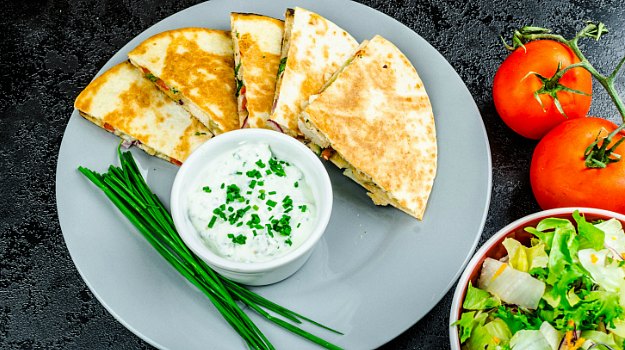As the winter chill sets in, our body's nutritional needs change. One of the best ways to strengthen your immunity, promote gut health, and battle common winter ailments is to adjust your diet according to the season. While we're all familiar with seasonal fruits and vegetables, grains and millets often don't get as much attention. However, certain flours made from these seasonal grains can be incredibly beneficial, helping your body stay warm and energized through the colder months.
Also Read: 7 Kinds Of Millets, Health Benefits And Uses Shared By FSSAI
As Nutritionist Rupali Datta suggests, "It's important to experiment with your diet, adding and subtracting ingredients according to the change in season." Embrace the diversity of seasonal grains, and make the most of these health-boosting flours to power through the winter months.
The key to optimal health during winter lies in practising food diversity and focusing on seasonal produce. When it comes to grains, our country offers a rich variety of flours, many of which are packed with fibre, vitamins, and minerals that can help us thrive in the winter. These flours are not only nutritious but also bring variety to your meals, moving away from the usual wheat or rice. Here's a look at some of the best flours to include in your winter diet, along with a few expert tips to help you get the most out of these seasonal grains.

There is a variety of different flours you can add to your diet
Here Are 6 Healthy Flours For Winter Diet:
1. Jowar Flour (Sorghum)
Jowar is a highly nutritious grain, rich in fibre and antioxidants. It's naturally gluten-free and is perfect for the winter months. Jowar helps maintain energy levels and supports gut health, making it a great addition to your diet. It can be used to make various dishes, from rotis to porridge.
Recipe Idea:
Jowar Tacos with Spicy Chicken Filling - Use jowar flour to make soft tacos and fill them with a spicy chicken or vegetable filling for a warming winter meal.
2. Bajra Flour (Pearl Millet)
Bajra flour is a staple in many Indian households during the colder months. It's rich in iron, fibre, and essential amino acids, making it perfect for combating the cold. Bajra is also known for its ability to help regulate body temperature, keeping you warm from within. Traditionally, Bajra is used to make roti, but you can also experiment with it in other dishes.
Recipe Idea:
Bajra Crepe with Chocolate Sauce - Instead of the usual roti, try a sweet and savoury crepe made from bajra flour, paired with a rich chocolate sauce for a warming treat.
Also Read: 5 Best Atta-Based Indian Desserts You Can Try At Home
3. Makki Flour (Cornmeal)
Makki flour, made from corn, is another great choice for winter. It's rich in carbohydrates and provides long-lasting energy, making it ideal for people who need sustained energy throughout the day. Cornmeal-based dishes, like the famous Makki ki Roti, are a winter favourite in northern India. Makki flour also supports healthy digestion, thanks to its fibre content.
Recipe Idea:
Makki Porridge - Use makki flour to prepare a warm porridge, much like polenta, which you can top with vegetables or a sprinkle of cheese.
4. Ragi Flour (Finger Millet)
Ragi, or finger millet, is a powerhouse of nutrients, especially during the winter months. It's rich in calcium, iron, and antioxidants, making it ideal for strengthening bones, boosting immunity, and fighting off winter illnesses. Ragi flour is also a great option for people with gluten sensitivity.
Recipe Idea:
Ragi Porridge with Nuts and Fruits - Make a nutritious ragi porridge, adding nuts, seeds, and fruits for a hearty and warming breakfast.
5. Kangni Flour (Foxtail Millet)
Kangni, or foxtail millet, is another highly nutritious grain that thrives in winter. It is a low-glycemic food, making it a great choice for managing blood sugar levels. Kangni is easy to cook and can be used as a rice substitute in many dishes. It's also rich in fibre, making it great for digestive health.
Recipe Idea:
Foxtail Millet Upma - Swap regular rice for kangni in your upma recipe for a gluten-free, fibre-packed twist on this South Indian classic.
6. Amaranth Flour
Though less common, amaranth flour is an excellent choice for winter. It is high in protein and essential fatty acids, and also contains vitamins A, C, and E, all of which help boost immunity during the colder months. Amaranth flour can be used in a variety of baked goods, rotis, or even pancakes.
Recipe Idea:
Amaranth Pancakes with Honey and Cinnamon - For a warm, filling breakfast, try making fluffy pancakes with amaranth flour, drizzled with honey and a sprinkle of cinnamon.
Expert Tips For Mixing Flours
You don't have to stick to one type of flour - mixing different flours can provide a broader range of nutrients and flavours. For example, you can mix 25% each of jowar, bajra, and makki flour with regular wheat flour for a healthier and more nutritious alternative to plain wheat flour. This mixture will help add variety to your meals while giving you the benefits of all these seasonal grains.
Experimenting with a mix of grains will not only enhance the nutritional value of your meals but also keep your taste buds excited. As you move into the colder months, don't forget to switch up your grains and explore the many flours nature has to offer.
About Neha GroverLove for reading roused her writing instincts. Neha is guilty of having a deep-set fixation with anything caffeinated. When she is not pouring out her nest of thoughts onto the screen, you can see her reading while sipping on coffee.









